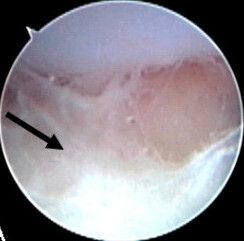Septic arthritis
(Redirected from Pyogenic arthritis)
Editor-In-Chief: Prab R Tumpati, MD
Obesity, Sleep & Internal medicine
Founder, WikiMD Wellnesspedia &
W8MD medical weight loss NYC and sleep center NYC
| Septic arthritis | |
|---|---|

| |
| Synonyms | Infectious arthritis, bacterial arthritis |
| Pronounce | N/A |
| Specialty | N/A |
| Symptoms | Joint pain, swelling, redness, fever |
| Complications | Joint destruction, sepsis |
| Onset | Rapid |
| Duration | Variable |
| Types | N/A |
| Causes | Bacterial infection, fungal infection, viral infection |
| Risks | Joint surgery, prosthetic joint, intravenous drug use, immunosuppression |
| Diagnosis | Joint aspiration, blood culture, imaging studies |
| Differential diagnosis | Gout, rheumatoid arthritis, reactive arthritis |
| Prevention | N/A |
| Treatment | Antibiotics, joint drainage, surgery |
| Medication | N/A |
| Prognosis | Variable, depends on promptness of treatment |
| Frequency | 2-10 per 100,000 people per year |
| Deaths | N/A |
Septic arthritis, also known as infectious arthritis, is a form of arthritis caused by an infection in the joint. It is a serious and painful condition that can quickly lead to significant damage to the joint if left untreated.
Causes[edit | edit source]
Septic arthritis is typically caused by bacteria, but can also be caused by fungi or viruses. The most common bacteria that cause septic arthritis are Staphylococcus aureus and Streptococcus. These bacteria can enter the joint in a number of ways, including through the bloodstream, from a nearby infection, or through a direct injury to the joint.
Symptoms[edit | edit source]
The symptoms of septic arthritis typically include severe pain in the affected joint, swelling, redness, and warmth. Other symptoms can include fever, chills, and a general feeling of being unwell. The knee is the most commonly affected joint, but septic arthritis can occur in any joint in the body.
Diagnosis[edit | edit source]
Diagnosis of septic arthritis involves a physical examination and various tests. These tests may include blood tests, imaging tests such as X-rays or MRI, and analysis of joint fluid.
Treatment[edit | edit source]
Treatment for septic arthritis typically involves antibiotics to fight the infection, and drainage of the infected joint fluid. In severe cases, surgery may be required to remove infected tissue and repair any damage to the joint.
Prognosis[edit | edit source]
With early diagnosis and treatment, the prognosis for septic arthritis is generally good. However, if left untreated, septic arthritis can lead to permanent joint damage and other serious complications.
See also[edit | edit source]
| This article is a medical stub. You can help WikiMD by expanding it! | |
|---|---|
References[edit | edit source]
External links[edit | edit source]
| Arthritis and related conditions | ||||||||||
|---|---|---|---|---|---|---|---|---|---|---|
|
| Infectious diseases | ||||||||||
|---|---|---|---|---|---|---|---|---|---|---|
This infectious diseases related article is a stub.
|
| Joint disorders | ||||||||
|---|---|---|---|---|---|---|---|---|
This joint disorder related article is a stub.
|
| Medical emergencies | ||||||||||
|---|---|---|---|---|---|---|---|---|---|---|
This medical emergency related article is a stub.
|
Search WikiMD
Ad.Tired of being Overweight? Try W8MD's physician weight loss program.
Semaglutide (Ozempic / Wegovy and Tirzepatide (Mounjaro / Zepbound) available.
Advertise on WikiMD
|
WikiMD's Wellness Encyclopedia |
| Let Food Be Thy Medicine Medicine Thy Food - Hippocrates |
Translate this page: - East Asian
中文,
日本,
한국어,
South Asian
हिन्दी,
தமிழ்,
తెలుగు,
Urdu,
ಕನ್ನಡ,
Southeast Asian
Indonesian,
Vietnamese,
Thai,
မြန်မာဘာသာ,
বাংলা
European
español,
Deutsch,
français,
Greek,
português do Brasil,
polski,
română,
русский,
Nederlands,
norsk,
svenska,
suomi,
Italian
Middle Eastern & African
عربى,
Turkish,
Persian,
Hebrew,
Afrikaans,
isiZulu,
Kiswahili,
Other
Bulgarian,
Hungarian,
Czech,
Swedish,
മലയാളം,
मराठी,
ਪੰਜਾਬੀ,
ગુજરાતી,
Portuguese,
Ukrainian
Medical Disclaimer: WikiMD is not a substitute for professional medical advice. The information on WikiMD is provided as an information resource only, may be incorrect, outdated or misleading, and is not to be used or relied on for any diagnostic or treatment purposes. Please consult your health care provider before making any healthcare decisions or for guidance about a specific medical condition. WikiMD expressly disclaims responsibility, and shall have no liability, for any damages, loss, injury, or liability whatsoever suffered as a result of your reliance on the information contained in this site. By visiting this site you agree to the foregoing terms and conditions, which may from time to time be changed or supplemented by WikiMD. If you do not agree to the foregoing terms and conditions, you should not enter or use this site. See full disclaimer.
Credits:Most images are courtesy of Wikimedia commons, and templates, categories Wikipedia, licensed under CC BY SA or similar.
Contributors: Kondreddy Naveen, Prab R. Tumpati, MD


